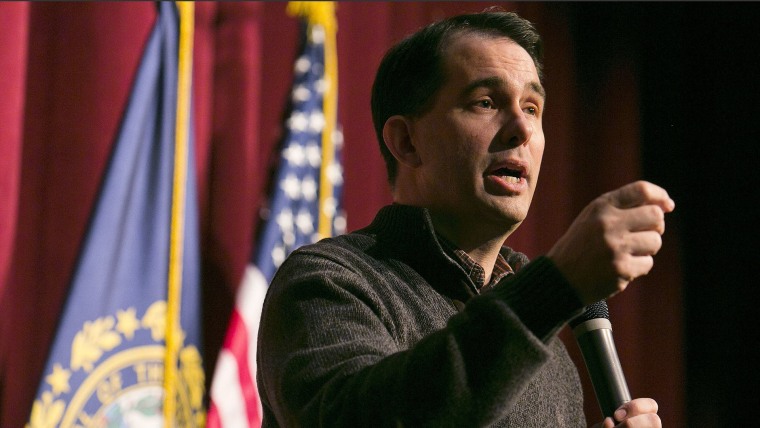On practically all the major issues, Wisconsin Gov. Scott Walker (R), an unannounced presidential candidate, has adopted a doctrinaire, far-right posture. No one would look at the Republican governor's agenda and call him a "moderate."
But Walker has evolved on some issues in ways that may make some GOP voters nervous. Over the course of a long career -- Walker became a political candidate at age 22 and has spent half his life in public office -- the Wisconsinite has shifted his stances on issues like
energy policy,
education, and even
gun safety.
But immigration remains the most problematic of them all. This
Wall Street Journal report yesterday caused quite a stir.
Wisconsin Gov. Scott Walker told a private dinner of New Hampshire Republicans this month that he backed the idea of allowing undocumented immigrants to stay in the country and to eventually become eligible for citizenship, a position at odds with his previous public statements on the matter. Mr. Walker's remarks, which were confirmed by three people present, vary from the call he has made for "no amnesty" -- a phrase widely employed by people who believe immigrants who broke the law by entering the country without permission shouldn't be awarded legal status or citizenship.
The governor's aides
vehemently deny the accuracy of the
WSJ piece and insist his position
has not changed. As best as I can tell, there's no tangible evidence to clear this up. Some Republican attendees said Walker endorsed a pathway to citizenship for undocumented immigrants; the governor denies it. Who's right? It's hard to say.
It's easy to say, however, that Walker, even before yesterday's report, has
struggled to bring clarity to his position on immigration.
In 2002, as county executive, Walker, according to Politico, approved a resolution that expressed "support of the Milwaukee County Board of Supervisors for a new program similar to the Federal amnesty program enacted by Congress in 1986 to allow undocumented working immigrants to obtain legal residency in the United States…." In the same position but four years later, Walker signed a resolution in support of comprehensive immigration reform that passed the Senate, according to the National Review. As recently as 2013, Walker told a local paper called Wausau Daily Herald that "it makes sense" for undocumented immigrants to obtain citizenship after penalties and a waiting period.
But once Walker committed to a presidential campaign, he
reversed course, telling Fox News, "My view has changed. I'm flat-out saying it." So, that settles that?
Not exactly; this wasn't a clean break with the recent past. As Greg Sargent
noted, in the exact same Fox News interview, the governor was asked whether he can envision undocumented immigrants paying a penalty and having a path to citizenship. "I believe there's a way that you can do that,"
Walker said earlier this month.
My general belief is that flip-flopping hurts Republican presidential candidates less than much of the political world wants to believe. John McCain reversed course on all kinds of issues in 2007 and 2008, but it didn't stop him from winning the nomination fairly easily. Mitt Romney effectively became an entirely different person in 2011 and 2012, and he too cruised to the GOP nomination. If Walker has to discard some of his principles to bring himself in line with party orthodoxy, there probably won't be much of a penalty.
But he actually has to complete the flip-flop. His reversal has to be 180 degrees, not 150 degrees. As of now, I don't think I know Walker's position on immigration, and I'm not altogether sure Walker does, either.
